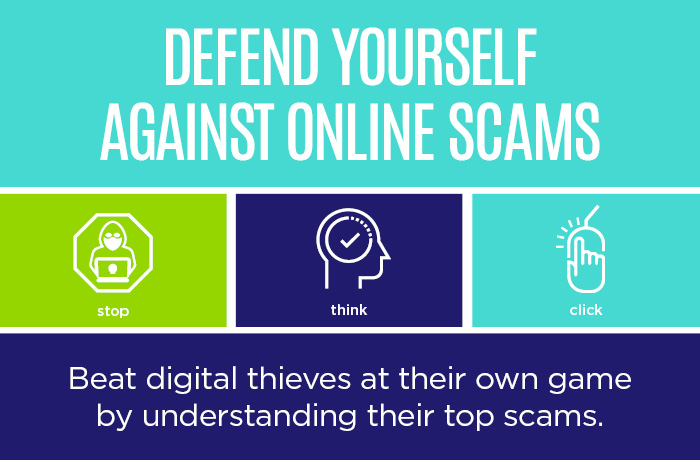Your Security is our Priority
Lost or Stolen?
DEBIT CARD
To report a lost or stolen debit card, call our main office at (830)254-3573 during business hours. After business hours and on weekends please call (877) 805-2304.
CHECK BOOK
To report a lost or stolen checkbook, please call our main office at (830)254-3573 or notify your local branch as soon as possible. Please provide the last check number written or the name of the payee to whom it was written.

Help Us Fight Fraud
Here is what you can do to help us fight fraud:
- Create unique, strong passwords
- Notify us of any changes in your contact information
- Protect your devices
- Keep your account information secure
- Know the reg flags
Red Flags to Watch For
Protect yourself from scammers by knowing the tricks they use. If it seems too good to be true, it is probably fraud.
Common types of scams will target users through fake emails, text messages, and phone calls. Warning signs that you could be dealing with a scammer include:
- If you are pressured to send money
- Threatened with law enforcement action
- Told to purchase gift cards and provide the codes as a form of payment
- Asked to cash a check for a stranger
- Asked to send money via wire transfer or Western Union
- Unsolicited offers requiring you to "ACT FAST"
The best way to avoid getting scammed - Do NOT give any personal information out to an unknown source.
- Never trust Caller ID
- Do not provide account or personal information via email
- Do not pay upfront for a promise of goods/services later
- Never give an unsolicited caller access to your computer
- Maximize your privacy settings in social networking sites
- Do not share personal information in social networking sites
- Be aware of disaster-related financial scams
If you provide information or send money to a scammer, there is often little we can do to help get your money back.
Contact us immediately if you feel you may have been a victim of a scam.
8 Tips for Banking Online Safely
- Monitor your accounts regularly
- Make sure that all transactions posted are ones you have authorized
- Report any suspected fraudulent or suspicious activity to the bank immediately
- Look out for strange emails
- Don't respond to emails that claim to be from the bank (or any company) requesting your account details or passwords. Banks will not reach out to you over email to ask for your account details.
- Avoid clicking links in email
- It is usually much safer to log in to your bank website manually to ensure you are entering a secure site
- Change your bank passwords regularly
- Avoid using the same password across multiple sites
- Make sure you are choosing a strong password that is a mix of upper and lower case letters, numbers and special characters
- Avoid using any words or phrases that contain your name, initials, or your birth date
- Enable two-factor authentication
- Many financial institutions have added a layer of security for account holders. Two-factor authentication requires you to enter an extra verification credential before you can access your account
- Disable automatic log in.
- Do not allow your web browser to store private username and password information for your online banking websites
- When available, only use your bank's official mobile apps
- Make sure you download apps from reputable sources such as the Apple Store or Google Play Store
- Not sure if something is legitimate?
- If you have questions about the bank's technology, call us. We will be happy to help!
For More Information
Check out our Online Education resources for additional information on how to help prevent identity theft and increase security while online.
